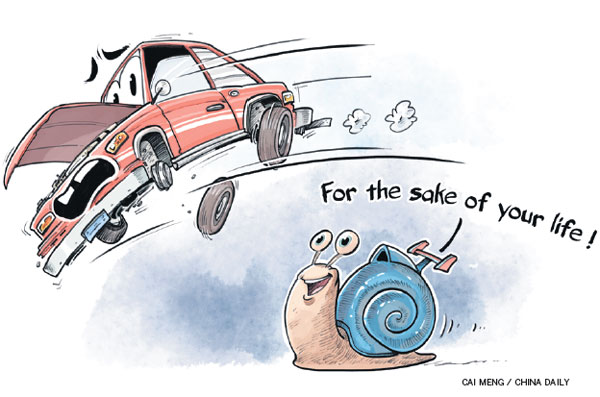We can save so many lives around the world if we just slow down. Each year, more than 1.25 million people - many of them young people - die in automobile crashes. And a large proportion of these deaths are preventable: about one-third is due to vehicles traveling at excessive speeds. In low- and middle-income countries, that figure is closer to half.
Regardless of where one lives, speeding is a lethal problem. Studies show that on most roads, in most countries, 40 percent to 50 percent of all cars travel above the posted speed limit. And whether or not a car is speeding can make the difference between life and death. For example, someone who is hit by a vehicle traveling at 50 miles (80 kilometers) an hour has a three times higher risk of dying than if they had been hit by a vehicle moving at 30 miles an hour.
This means that just setting urban speed limits at 30 miles an hour or less, and allowing local authorities to reduce speed limits further around schools and other areas with high pedestrian traffic, would save many lives. It is encouraging to see 47 countries have already implemented these commonsense practices. But we must do far more to expand the reach of such measures, and to ensure that more governments adopt them.

Not surprisingly, countries that have embraced a comprehensive approach to road safety, such as the Netherlands, Switzerland and the United Kingdom, have had the most success in reducing their rates of death and injury from automobile accidents. These countries have made it a high priority to reduce rates of speeding, and they have taken steps to improve the safety of their roads, vehicles, drivers, and all others who use roads, including pedestrians and motorcyclists.
For example, proactive countries have built their roads to include features that calm traffic, such as roundabouts. They have also established speed limits tailored to local road conditions, while stepping up enforcement to deter traffic violations. And they have begun to require that all new cars include life-saving technologies such as autonomous emergency braking.
Municipal leaders worldwide - from Addis Ababa to Mumbai to Bangkok - have played a key role in implementing these measures, which are not just saving lives, but also making their cities healthier in other ways. Safer streets encourage more people to walk and cycle, helping to reduce air pollution, which has been linked to chronic respiratory disease, cancer and other noncommunicable diseases.
To build on these achievements, Bloomberg Philanthropies, the World Health Organization, and other partners are working with municipal leaders to help them gather the data needed to identify problem areas more effectively. They can then determine where to target their limited resources to make the biggest improvements. We are also providing support for local authorities to stage public-awareness campaigns that will help build grassroots support for new road-safety legislation and stronger penalties.
Improving road safety is one of the biggest opportunities we have to save lives around the world. And the good news is that, starting with the solutions outlined above, we already know how to do it.
The fourth annual United Nations Global Road Safety Week, from May 8 to 14, provided a chance to draw more attention to these solutions. Over the course of the week, community events were held in cities around the world, to help raise awareness of the problem and advance more solutions. These events took many forms: slowing down street traffic, campaigns in schools, and roundtable discussions to explore how we can ensure that smart policies continue to spread.
All of these events and initiatives brought together local and national leaders in government, civil society, business, law enforcement and other sectors. To learn more about the week's events, and how every community can take steps to reduce speeding, we encourage readers to visit the Road Safety Week website.
A world in which far fewer lives are lost to automobile accidents is possible and entirely within our reach. It is up to all of us to make it a reality.
Margaret Chan is the director-general of the World Health Organization, and Michael Bloomberg is the WHO's global ambassador for Noncommunicable Diseases.
Project Syndicate
